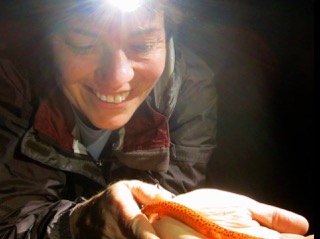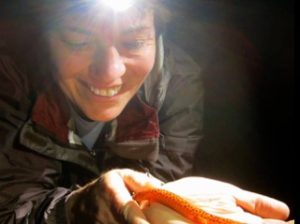
Scientist Karen Lips to discuss why frogs and salamanders are on the decline and what can be done to protect them
Pet trade and emerging infectious diseases are driving amphibian extinctions
(Millbrook, NY) On Friday, October 21 at 7 p.m. join the Cary Institute for a special lecture by University of Maryland biologist Dr. Karen Lips, who will detail the underlying causes of global amphibian declines and extinctions.
Dr. Lips was one of the first researchers to sound the alarm on massive frog die-offs in Panama and Costa Rica as a result of chytrid fungus. At her study site in Western Panama in 1993, the fungus was pervasive. “We’d see frogs that looked healthy. But when we picked them up, they would jump once, and then die right on the ground.”
She has since become one of the world’s leading experts in amphibian diseases, leading collaborative efforts to track and understand what we can expect as new pathogens emerge and spread. Dr. Lips’ work focuses on disease ecology and how chytrid fungi affect amphibian species, populations, and their ecosystems. Her ultimate goal: conserving frogs and salamanders.
Dr. Lips is also interested in using social media to communicate science, and has become involved with policy issues related to wildlife diseases, including how they relate to trade. Learn more about the ecological significance of amphibians and Dr. Lips’ research in this American Association for the Advancement of Science video: https://www.youtube.com/watch?v=mgVPh8PCCk4.
Free and open to the public, the lecture will take place in the Cary Institute auditorium located at 2801 Sharon Turnpike, Millbrook, NY. Seating is first come first served. For more information call (845) 677-7600 x121 or visit the website www.caryinstitute.org.


